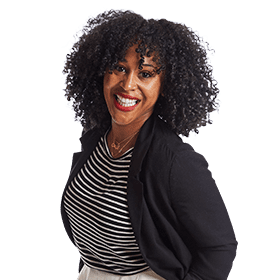Program Director, Cultural Resilience
Enterprise Community Partners
FOCUS
Meghan’s vision for a Culture of Health begins where people spend most of their time living and creating, in homes and communities. She supports equitable community investment by creating environments for healing-centered approaches, collaboration, lifting residents’ voices, and building social cohesion. Her vision is one where people and communities are not solely strengthened by their adaptive capacity or resilience in the face of trauma and disaster but by their exposure to opportunity, inclusivity, and agency in the governance of their own life circumstances.
STRATEGIC INITIATIVE: Sanctuary Spaces: Healing for Black & Indigenous Professionals Working in Community Organizing & Development
Within the fields of community organizing and development, black and Indigenous professionals have particularly precarious roles, as individuals are tasked to 1) address generationally inherited manifestations of racial trauma in one’s personal life, 2) reconcile secondary trauma exposure potentially experienced by working in communities, and 3) navigate organizational systems that reinforce white dominant structures. As a result, black people are vulnerable to traumatization while working to protect black people vulnerable to traumas within systems of perpetual racial trauma. The Sanctuary Spaces Immersion creates space for black and Indigenous practitioners to be stewards of their trauma, recognizing that community development has been a vehicle for much of the place-based oppression we see today. Selected leaders create healing-focused sessions for participants, while the Sanctuary Fund pools funding for future immersions. The immersion calls participants to engage in experiences that support caring for and responsibly guiding other beings toward healing. ”Healing is the resilience instinct of our bodies(1),” and Sanctuary Spaces support participants in exploring the resilience tools that already exist within. Ideal partners are grounded in black and Indigenous healing practice.
(1) Brown, Adrienne M. Emergent Strategy: Shaping Change, Changing Worlds. 2017. Print.
MORE ABOUT MEGHAN
Meghan’s experience as a West Point cadet and Army officer tested her creativity in fast-paced environments, enabling her to learn the importance of collaboration. Her academic career centered on translating knowledge into practice to support health equity. Working with survivors as a sexual assault response director continues to remind her of the importance of healing practices. Her current position, cultural resilience program director, is a culmination of these experiences, uplifting community-driven approaches for healthy and equitable community development.
Click here to watch Meghan’s Legacy Project video.

